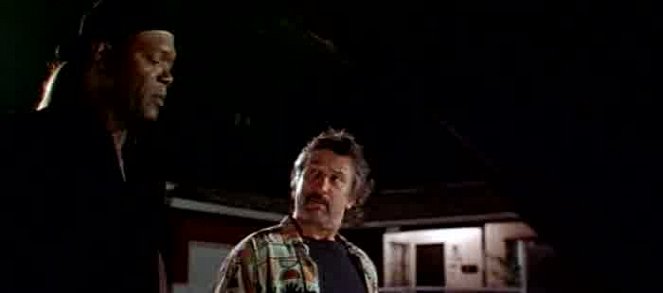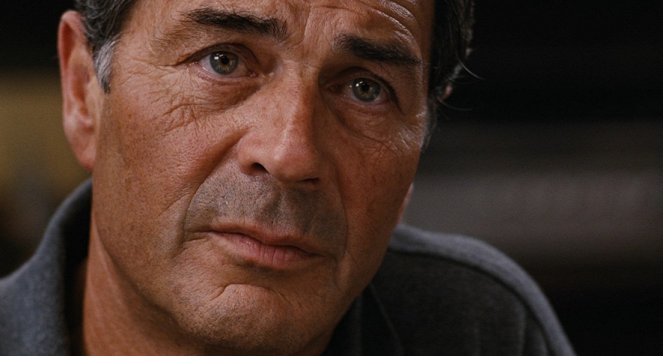Regie:
Quentin TarantinoDrehbuch:
Quentin TarantinoKamera:
Guillermo NavarroBesetzung:
Pam Grier, Samuel L. Jackson, Robert Forster, Bridget Fonda, Michael Keaton, Robert De Niro, Michael Bowen, Chris Tucker, LisaGay Hamilton (mehr)Streaming (4)
Inhalte(1)
Mit Schwarzgeld wird Jackie Brown am Flughafen gestellt. Das FBI wittert die große Chance, durch Jackies Aussage einen Schmuggler-Ring auszuheben. Die Cops sind bereit, Jackie laufen zu lassen, wenn sie den Namen ihres Auftraggebers preisgibt. Die Entscheidung fällt ihr schwer, denn Ordell Robbie, ihr Boss und Drahtzieher der dubiosen Waffen-Schmuggel-Geschäfte, würde sie umbringen, wenn er Wind von einem Deal mit dem FBI bekäme. Bevor sie sich entscheiden kann, kommt alles ganz anders: Sie lernt den Kautionsvermittler Max Cherry kennen. Die beiden schmieden einen Plan, und plötzlich hat Jackie die Idee, wie es ihr gelingen könnte, Ordell gegen die Polizei auszuspielen... (Universum Film)
(mehr)Videos (4)
Kritiken (12)
Da schaut man sich Tarantinos Filmografie an, klickt auf Jackie Brown… Und stellt fest, dass man den Film nicht bewertet hat. Es ist klar, dass er von mir fünf Sterne bekommt, obwohl ich beim ersten Mal nicht so begeistert gewesen bin. Jackie Brown ist ein schönes Werk mit der tollen Pam Grier in der Hauptrolle und dem unwiderstehlichen Nichtstuer Robert de Niro in der Nebenrolle, welches vor allem Brian de Palma ehrt. Je öfter ich diesen Film sehe, desto mehr mag ich ihn.
()
Jackie Brown ist einer der anspruchsvolleren Tarantino-Filme, deshalb war er auch immer weniger beliebt. Aber ich persönlich bin froh, dass Pam Grier ihr Comeback hatte. Später, in The L Word, hat sie aus diesem Ruhm Kapital geschlagen.
()
Twenty-five years and six or seven films later, Jackie Brown remains Tarantino’s most disciplined film, which makes it all the more pleasantly surprising. It’s tempting to wonder what alternative path his filmography might have taken if it had been a bigger hit in its time. Perhaps Tarantino would have taken more inspiration from other artists, with less showing off. Of course, that isn’t possible, not only because we can’t change the past, but mainly because the given period and the very nature of Tarantino’s personality had a greater influence on the development of his career as we know it. The expansion of DVD distribution and the internet boom with the attendant activation of movie fans had a tremendous effect on the spectacular eclecticism of Tarantino’s later work. Besides the fact that, as an egocentric boor and arrogant film nerd, he could not overcome his need to out-nerd everyone else and vehemently carve out his own monument to the untouchable and universally beloved pop-auteur. With this in mind, we can see how, even in his most modest work, he simply has to push himself to the forefront and imprint his ego on the telling of a story that doesn’t especially lend itself to that at all. From the voice on the answering machine and the megalomaniacal closing credits featuring his own name, to generating trivia that actually only highlights the filmmaker’s supposed sophistication, to the problematic aspect of Tarantino childishly and nerdishly showing off that, thanks to the number of blaxploitation movies he has watched, he can write more gangsta talk than real gangstas actually use. At the same time, however, it’s impossible to deny Tarantino’s obvious talent as a filmmaker, his masterful understanding and use of the medium’s means of expression, and his brilliance in constructing fictional narratives that work extremely well even though they merely rely on other works of fiction and genres rather than on reality. What’s even more surprising about Jackie Brown is that it is partially about aging. Not on its social and personal levels, but primarily in terms of the aging of film and genre icons. But let’s also acknowledge that, as a project in which a thirty-something cast his beloved fifty-somethings, Jackie Brown can actually bring to mind Tomáš Magnusek, with whom Tarantino perhaps has more in common than we would like to admit, though definitely not in the area of filmmaking skill.
()
I’ve always heard that Jackie Brown was the different and weaker Tarantino film. After finally watching it, I have to say that I can’t agree with that statement. It’s not such an atypical Tarantino, it’s a heist movie with dialogues full of one-liners (though less sharp than in Pulp Fiction or Kill Bill 2), a forgotten black star and Samuel L. Jackson in the main roles, drugs, profanity, unexpected murders – is that really atypical for Tarantino? No way. The biggest difference is that, compared to the rest of Quentin’s filmography, Jackie Brown is relatively restrained, which is due to the genre. And is it his weakest film? I don’t know, he doesn’t make bad films, and from the better ones it’s hard to pick one that would clearly beat the rest.
()
The film adaptations of Elmore Leonard's novels, such as Soderbergh's Out of Sight or Jackie Brown, have something in common: a plot that flows slowly. But I don't feel bored, because in both cases a skilful director is behind the camera and the result is a cool spectacle. Of course, anyone expecting another Pulp Fiction must will have been disappointed. Tarantino intended no such thing, he even declared: “To make another Pulp Fiction? That would be boring.” He tried something else and I’m happy with it. I would highlight in particular the sensitively portrayed relationship of the two main characters (Forster-Grier) and the idea of the cyclical repetition of the plot in the supermarket scene. Tarantino just knows what he's doing, no matter what he's doing.
()



Werbung